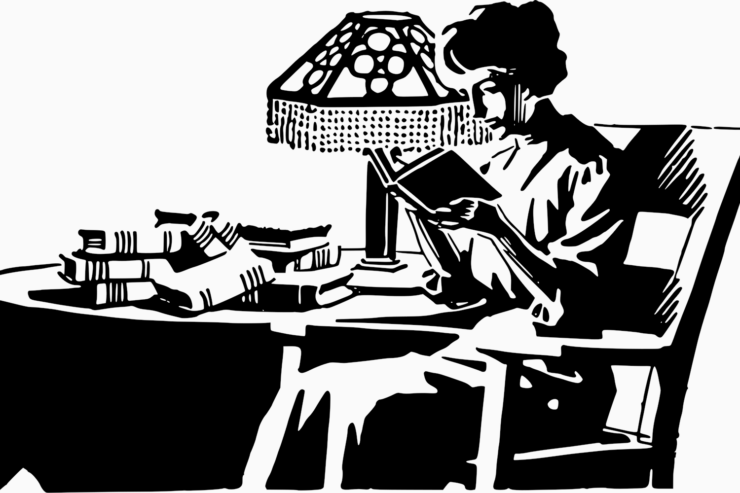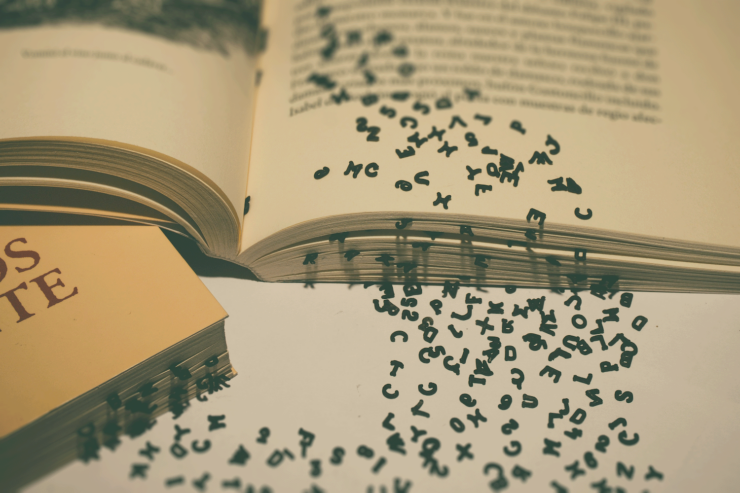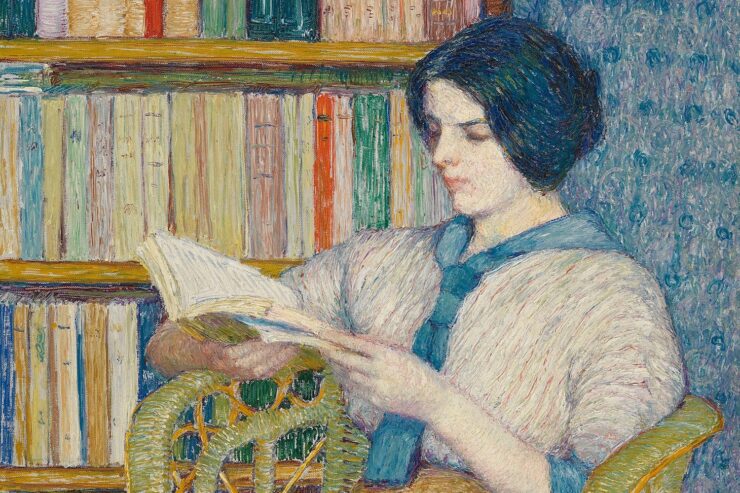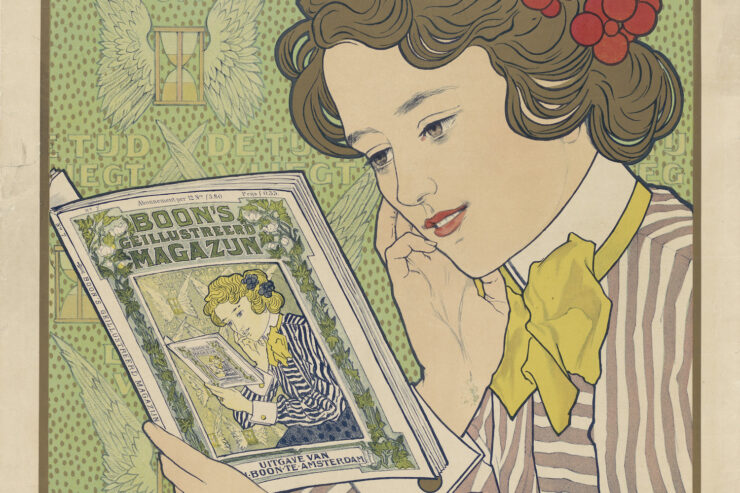We are barely a month into a fresh new year and already I have far too many feelings about how we talk about books, about reading, and about our relationship, as readers, to books, and to the having and shelving and displaying of them.
It started with The Washington Post, reporting on a recent poll about reading. Polls about reading are, as far as I can tell, always depressing, either because of the results, or because of the way people discuss the results. This is maybe both. I am not going to bemoan the small numbers of people who read books, because that more often than not comes off as patronizing and smug, the mirror image of the kind of tech bro who thinks everything can be a blog post.
But I am mildly horrified at framing big readers as a matter of being part of the “one percent.” Andrew Van Dam writes, “Those of us who read more than 50 books are the true one-percenters: people who read more books than 99 percent of their fellow Americans.”
You know what this framing does? This presents reading as an elitist activity. Again.
I thought we were done with these rusty, decrepit old ideas about elitism, and snobbery, and ivory towers and oblivious dweebs with their noses in books—or whichever ragged old cliche about intellectual pursuits you’d like to offer up. I thought the point, in more enlightened times, was to make reading accessible, make it an ordinary thing that people do in order to learn and experience and understand and, simply, enjoy.
I suspect that Van Dam thinks he’s just being playful and funny, but it set my teeth on edge before I could even get further into his analysis of the poll in question, which was shared by YouGov. I find it hard to take conclusions about American reading too seriously when they come from a poll of a mere 1500 people, but when The Washington Post talks about things, people often listen.
We are not one-percenters, those of us who read a lot. We’re just readers. We don’t need to be set apart by the language of capitalism, described using the language of the ultra-wealthy, as if books make you a billionaire.
But it’s not just this. It’s British GQ running a list of “hot guy books” as holding the right book is, apparently, “a kind of brainy thirst trap.” (This is really just a list of different cover aesthetics, but I digress.) It’s The New York Times reporting on the idea of “bookshelf wealth,” a nauseating term that just means you (a) have a lot of books and (b) shelve or display them attractively.
The Times quotes one critic of the concept, Keila Tirado-Leist, who asks—with what I imagine is no small amount of tartness—“Who does it benefit to constantly have to name and qualify and attach wealth to any kind of style or home-décor aesthetic?”
Who does it benefit to treat books like accessories, reading like an accumulation, readership like it’s a ticket to some kind of elite club? Why do we keep doing this? It makes me feel very Old Man Yells at Cloud to be bothered by this, but I am. I still am.
It goes back to an earlier complaint: a reader is not a consumer of books. You can call it that, but you can’t make it true. A book does not get consumed; a book gets read, shelves, returned to, passed on, sold back to the bookstore, picked up at Goodwill. A book might outlive every one of us. Publishing is a (largely) capitalist pursuit, yet books exist both within and outside of that framework. A book has value even when no one is making money from it. If you lend your favorite book to your best friend and they love it as much as you do, who profits?
Why would we ever in seriousness want to ask that question?
And yet these pieces that insist on using the language of wealth—or, at best, the language of selling oneself—they make me feel like books are widgets. Like they’re just one more consumer object to use up and destroy, to pretty up our homes with. A nice little decorative object from Target that you throw away without a second thought when it stops charming you. Do you have bookshelf wealth if you have enough cute brass animals from vintage stores? Are you a one-percenter if you’re the first person to post a review on GoodReads?
Language matters. If it didn’t matter, we would not be readers; we would find other ways to entertain or distract or educate ourselves. And we choose the language we use. We don’t, collectively, culturally, have to be like this. We really don’t have to start our year like this.
How do you want to talk about books? What kind of bookish conversations send you racing to the bookstore or your local library? Do you think about characters and how they interact, or stories and how they unfold, or mysteries that you can’t wait to solve? What can we, as a bookish community, do differently—what conversations and topics are ignored in favor of these trend pieces that barely touch the surface of what it is to be a reader and to love books?
I want to see more writers talking to each other. I want to see readers tracing threads of ideas, of concepts, of metaphors, across books and stories. I want people to take books seriously, but also to have fun, to let a sense of play creep into the way we read—as it can do in the writing, especially of super-imaginative books. I want people to think less about being authoritative and more about being appreciative, emotional, engrossed, impassioned, full of questions, ready to be awed. It is pretty obvious that I love questions. (Cue Jodie Foster, in this season of True Detective: “Ask the question.”) But I also love answers. How can we talk about books in ways other than these? How can we change this bookish landscape for the better?















Thank you, you gave me an idea for a comment so far off topic for this I will turn it into an essay.
As a reviewer, I get an abundance of arcs. Usually I understand the strategy behind the ad copy that accompanies books. Every once in a while, I get a pitch I cannot fathom why they would send to me, focusing on the value of the book as a commodity than as a read. Honest, if I was in this as an investment, I would not own so many Mack Reynolds and Fred Saberhagen paperbacks.
(There is or was a mystery series about a collectable book seller who solves mysteries on the side. I found the lead’s view of books as interesting mainly in terms of how much money each book might go for plausible but unpleasant to read)
I saw that once with an rpg ad but what happened there is the publisher sent the ad copy meant for customers to the store-oriented channels, and the ad copy meant for stores to the gaming magazines.
I like to talk about what the characters are like and what happens to them, and sometimes about themes, description, cultural stuff, etc. I have bought non-fiction and a cookbook most recently so it’s been “Hey, this is what Arendt wrote about….” and “What recipe shall I make for supper?” :)
Before 2020 I relied on the library and the ‘net and a few years would pass between book purchases. Now I read what’s on my shelves, read on the ‘net, and usually use some of my Christmas money and/or birthday money to buy books.
While I wish the YouGov survey included demographics beyond college degree and no college degree, the 99% number in no way suggests income, like WaPo did. The most books they broke down by demographic was “more than 20” which included 8% of those with no degree and 15% of those with one.
Having said that, I totally agree with you on GQ’s hot guy books or NYT’s bookshelf wealth. The sad thing is it moves into books as a decorative concept. There are sites that sell books by the foot, from style of bindings by type or even color. Even worse, there are sites that sell fake bindings to fill up your shelves.
I’m not associated with the book industry except as a voracious reader (around 200 last year). The closest thing to a general discussion group I’ve found is Reddit, and it’s impossible to navigate. Perhaps you could create a persistent open post to talk about books in general.
I strongly agreed with your essay that readers are not consumers of books. Thank you for returning to and expanding on this topic so eloquently, because the framing of reading as a primarily capitalist activity skeeves me out to the point that my thoughts on the topic get inarticulate.
That said, my thoughts on changing our bookish landscape for the better… for many years, I was a solo reader who didn’t interact with the wider reading culture; now that I have joined three book clubs (two sf, one sf&f), I’ve observed a spectrum of engagement (for lack of a better word) in discussing the month’s book.
On the casual end, the discussion can be summed up as “I liked it”/”I didn’t like it”. So… the discussion takes up those angles of appreciation and emotional engagement that you want to see (and, to be clear, that I want to see!), but… I also find myself dissatisfied with the quality (admittedly, subjective) of the discussion. The depth of passion isn’t there, and the discussion doesn’t really move past first impressions to get at the whys – unlikable or unreliable characters? bad pacing? incoherent plotting? – of “I liked it”/”I didn’t like it”.
On the conscientious or attentive end, the discussion is harder to sum up. The discussion doesn’t revolve around first impressions, though it doesn’t necessarily get analytical. The organizer comes prepared with a list of questions to guide discussion, though if a question prompts a tangent, that’s encouraged because it allows exploring the book from another angle. If someone didn’t like the book, this might give them some appreciation for it or what it was trying to do, even if it doesn’t change their mind. So I’m with you, I love questions!
(One club is on the casual end, one is on the attentive end, one is somewhere in the middle.)
I acknowledge that different book clubs fill different needs for different people, but I think if the bookish landscape is going to resist this trend towards framing reading as a capitalist activity, there needs to be a certain level of critical engagement.
This article reminds me of a comment I heard at Barnes & Noble. Someone passing a display table of clothbound Penguin Classics said, “I think it’d be great to get a set of these for my kids, you know, because it’ll make it look they read” (emphasis added).
The most often cited meme I have seen for adult reading is that half of Americans never read another fiction book once they are in the workforce, and mainly read nonfiction for “practical” matters. And that perhaps that nonreading percentage has been getting larger over time. That is of some interest because narratives are present everywhere whether one reads them in a book or hears them on television, radio or the internet. But the presentation of information in printed matter exercises a different part of the brain versus a visual or oral presentation. For instance, oral presentations are much more likely to involve exaggeration and stereotypes and other punchy language that is intended to be easy to remember, while written presentations are more likely to tease out an idea at greater length and require some logic to hold the extended presentation together. “The medium is the message.” To some extent. So it’s not just that reading a lot is a snobbish preoccupation, a highly literate population is likely to be a different kind of civil society that considers its challenges in a different way. That has real life political consequences. The tendency of our society to be more focused on oral and visual media may well be making it more tribal and easily divided into violently opposed factions by those who benefit from division.
That’s a really apt comment and extremely thought provoking.
Some people talk about books like this because doing so leads to links that lead to outrage clicks that lead to ad revenue.
The rest of us could choose not to participate in that cycle and instead talk about books in our preferred manner without pleasing the SEO gods with an external link to the irksome “inspiration.”
I loved this rant, Molly, especially the news that that “survey” was on all of 1500 people. What gall!
Do I take some slight pleasure in seeing my personal “read books” count on my local library books read report? Of course. What I think would be more interesting though, is what one’s “read books ” list would show if it recorded every book read since childhood. It would reveal all the phases one’s life has gone through.
For me, it would include Winnie the Pooh and Wind in the Willows, required reading in high school of which much stays with me, Chaucer, and Julius Caesar in freshman year, The Odyssey in sophomore year, lots of poetry, all of Bronte, and even Ethan Frome, (which was deemed suitable only for the the mature seniors English Lit class), and into a long science fiction period, and so on. The list would also be strongly related to the social and political history of the different decades I have lived through. (80 so far) and reveal other facets of my life and upbringing.
Thanks for giving me something to ponder.
Nice to see the critique of the term “consume,” which is very annoying as a shorthand for reading. It reminds me of how people talk about “stealing” and “theft” when it comes to ideas, words, digital works, etc; my eyes roll so hard when people complain about someone else “stealing” an idea from their favourite author. Words and ideas don’t vanish when someone encounters them – they persist, and can be revisited and shared and spread around. Not like my family’s go-to congee that I consume, or the handmade pottery my mom keeps that she couldn’t replace if she tried. People really struggle to understand how accessible words and ideas are.
I got mad recently about the whole consumption of books thing and some stroppy man had a go at me because I objected and I just blocked his a** on Twitter, because I am damned if I’m going to be told how to describe my reading habits by some capitalist t***!
I READ books. I consume food. Books stay with me, food passes through me – that’s the difference!
I’ve been thinking of adding tags/shelves on StoryGraph and Goodreads to capture shared themes across works. I have one for social horror after reading Linden Hills by Gloria Naylor – I would add The Stepford Wives to that, if I ever get around to reading it. I’ve been doing a meandering reread of The Shadow of the Wind by Carlos Ruiz Zafon, and based on that I think my next tag/shelf will be sentient settings. Or a tag/shelf for “beautiful friendships” based on some other things I’ve been reading.
I expect the people who use elitist, capitalist terms to describe people who love books are in fact smug. They like feeling that their hobby is an improving one, and that they like reading because they are a superior sort of person.
Unfortunately, as you say, people listen, even if the comments are just boasting or intended as wry self-deprecation or are obviously nonsense.
This leaves people feeling like they aren’t good enough if they read two books a year, or if they “only” read romances or graphic novels. And people who feel like they are being shamed for not reading enough, or not reading the right books, or reading YA as an adult, are not likely to see a problem when governments start banning books. They have already bought into the idea that some books are the “right” books, so of course that implies that some are “wrong.”
While I do object to the tone of the mentioned essay, and detest the term “consumer of books,” I do have to agree that readers are the true elite.
Not in the sense of material wealth, power, or influence, but of intellectual and spiritual wealth.
Sad, and infuriating, but true.
I agree with the sentiment here, but I’m finding it very difficult to think what exactly the problem is.
Obviously it’s bad that we are living in a (capitalist, in this case) society which encourages this kind of status-driven thinking, but this is just to highlight one of the many symptoms.
The people who treat books as basically display items, in one way or another, will behave like that with most things, and will move onto something else. In the meanwhile, depending on your point of view, they either help the publishing industry and authors, or waste valuable resources, or both. I’m concerned with the whole society they help to prop up, not this particular thing.
Books are certainly a bit of an exclusionary thing, simply because the school systems we have fail many children. However, I know lots of adults who are perfectly literate who just aren’t into fiction, or even books. I know people who have grown into fiction, and people who have lost their taste for it. I think the important thing is just to encourage people to realise books may be something they would enjoy, while also respecting the fact that there will be things they are into which we won’t find interesting. Everyone is always telling me about the television series’s which I am missing, and which I am sure I would enjoy, but it’s just not a format I have very much interest in any more, beyond things from the past. I still am really into films. They both do quite different things – luckily, I don’t have to chose.
I suppose what I think is that books are manifestly important to people who enjoy them, and perhaps even are bettered by their engagement with them. But they would maintain that importance for those people no matter how they were presented. There are other people for whom they are the latest in a long line of fads or statements. I guess there are people who fell into the second category and have crawled out of it, but I struggle to think there is anyone who genuinely likes reading who would simply become facile in this way – at least, not without something more serious happening to their personality.
But, ironically, this is just the kind of very simplistic thinking about people’s psychologies which the modern novel (and lots of other modern – and older – media) undermines in the reader (one hopes). So I wonder what is actually going on.
Have not re-read the article before posting, so apologies if I have misrepresented, or missed, any aspects of the discussion.
I find this rather snarky. Let people talk about book however they want. Better that media talks about books and reading in a way that sells books as commodities than not at all.
Molly obviously has some issues with capitalism. Fair enough, but if you want to put a bullet in those who profits from book publishing you put a bullet in your own foot as a reader. Of that I’m pretty sure.
This article is mainly about books. I think the problem may be deeper than books. About 20 years ago, when I was about 60, I got laid off because the company I was working for was going out of business, and I decided to play with unemployment insurance for awhile. (Before that I had always been the kind of person who could get a new job on his lunch hour.) In order to get unemployment insurance in this state, you have to at least simulate a job search, so I got out my old resumé and sent it around. I got an interesting call from a professional resumé writer who said my resumé was too verbose and too long. It was one page long and the summary, which in classical resumé style was at the top, was about 100 words long. I said I thought it was pretty compact. The resumé writer said she had scientific evidence that almost no one who reads such material reads more than 25 or 30 words — what I would have previously thought of as borderline functionally illiterate. She sent me some of the material on the subject and her take seemed to be accurate. People who cannot get through 30 words of text are not going to be reading books; they are not even going to be able to get through a light magazine with lotsa pictures except when stuck on an airplane or in a dentist’s office. Subsequently I noticed that when attempting to communicate with people I didn’t know it was advisable to use very simple language and to stick to a few points, memorandum-style. As someone else here said, we’re reverting to a pre-literate, quasi-tribal village mode of communication. Never mind books — apparently most people can’t really read at all. It’s no wonder they’re so easily manipulated, as witness our current political and other modes of discourse.
I’m reminded of the many articles that came out, way back when The Boy Who Lived burst onto the scene, excitedly talking about how kids were reading! And as the series progressed, more articles that were very excited that kids were reading such large books! As if kids had stopped reading altogether except for required schoolwork. I found this very weird indeed. I belong to a Facebook group for readers and writers, but here I find that people who post their bookshelves/reading nooks/lavish libraries do so knowing that they are in a group that appreciates seeing those posts. There is also plenty of sharing about books liked and disliked, requests for recommendations of something new to read or something to give as a gift to a particular kind of person, sometimes posts about someone’s book-themed wedding.
While l agree with the article as a whole, I must take issue with one comment, especially as it came up in one response and is something that I frequently see in other contexts.
”I find it hard to take conclusions about American reading too seriously when they come from a poll of a mere 1500 people”
As a statistician, I can firmly state that is a very large sample size and that the accuracy of the resulting estimates likely to be quite good. I would have to go back to the Washington Post article to see their footnotes on accuracy, and some subcategories with small numbers will have a lower accuracy. And I would need to see the sampling design to look for any potential biases (in the formal, statistical sense of that term). But I would put a large credence in any survey of that size, if done properly.
it is surprising how small a sample size is necessary for a reasonably accurate estimate of many types of parameters. Even a few dozen are sufficient in some cases. Please do not continue to promulgate the “They only sampled X people” complaint against surveys when the results are not to one’s liking. It just undermines numerical literacy, which is just as important as the type of literacy being promoted here.
I appreciate this gentle correction! I took one statistics class in college, did not understand much of it, and clearly retained none of it – but will do my best to remember this. I did find other bits of the poll frustrating, but that had more to do with the slipperiness of describing genres than anything else, and that is tricky work at the best of times.
(The original poll article is at YouGov – the WaPo was just reporting on it – so should you want to take a peek, all the details are there.)
Molly – thanks for the article. While I have not red the van Dam article (because TWP wants me to subscribe – no), I suppose there’s something to be said about enumerating one’s completed books. Yeah, I get what you’re saying. I think I can see both sides.
While it is possible that humans are likely having a p*&#ing match to see who’s gobbled down more literature, there’s also the argument that nowhere in this debate does it say anything about number of books (stories) absorbed. I can say, “Hey, I read 48 books last year.” So what? It’s not the number that matters. How many of those 48 did you get anything out of?
I do think that there may be something on his side as well (again – haven’t read the article), but people who claim to have gone through (read) a certain number of books in a year I don’t generally think they give a number to just put up a number. Some will, sure. The insecure, perhaps. But generally the idea of saying you’ve read a book or a certain number of books, suggests that yes, you read it, and processed it, and got something out of it, and you are better for it (etc.).
Humans are just that way, as soon as there is another person in the room, we start size each other up. “what does he/she have that I don’t?” “How do I have an edge?” I would say it’s evolutionary – survival. We rank one another. We can sit around and sing kum-bah-ya and “why don’t we all just chill and be, and love, man?” And the answer is because we want to win. We want to be better.
Thank you for the article.
-Copper
Because these days people think of books largely as physical objects. Even as “clutter.” Many people assert that physical books are inherently dusty, moldy, and full of insects. Even that they will collapse your house with their weight. None of these things are true, but books are getting bad press at the moment. And yes, people find books more intellectually challenging than social media and think book readers are elitist. At this rate I am glad to see even decorating articles urging people to acquire books of carefully selected sizes and arrange them only by color. Instead of in any way that would enable the owner to actually locate a specific book and you know, read it. Maybe they’ll open one by accident and find out they enjoy it. I can only hope.